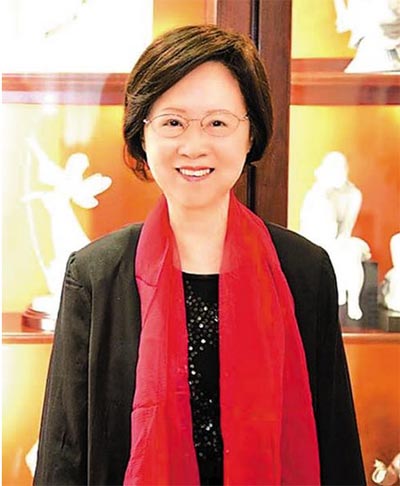
??Taiwan-based romance novelist Chiung Yao. [File photo]
A Chinese mainland scriptwriter, who was found to have infringed on the copyright of a Taiwanese novelist in his initial trial, handed new evidence to BeijingHigh People's Court on Wednesday, in a bid to challenge the original verdict.
The copyright dispute between Yu Zheng, the popular mainland screenwriter, and Chiung Yao, the well-known romance writer started at 9:30 am Wednesday at the high people's court. It was the second trial of the case.
In December, Beijing No 3 Intermediate People's Court gave the judgment that Yu used Chiung's works in his screenplays without Chiung's permission and identified that Yu had violated Chiung's copyright, asking him to pay 5 million yuan ($805,775) in compensation.
However, Yu disagreed and appealed to the high people's court later.
Yu and Chiung were absent at the second case hearing.
Ma Xiaogang, Yu's lawyer, said he had provided new evidence sent from Taiwan for the high people's court earlier before the Wednesday's trial, saying it can prove his client is innocent.
The evidence showed that the writer of the controversial novel, Mei Hua Lao, was Chiung, but the copyright ownership had been transferred to another cultural and communication company, Ma said.
"Therefore, my client didn't violate the copyright of the romance novelist, and he also gave his own ideas based on the novel and created more other plots to process or enrich the story," he said, adding that Yu's screenplays were also works that should be protected under laws.
However, Wang Jun, Chiung's attorney, refuted and doubted the legality of the evidence during the trial. He said the deadline for giving new evidence was March 25, and the procedure by which Yu supplied the evidence was illegal.
"In addition, as the evidence was provided by Taiwan, it should be reviewed first by notarial offices in Taiwan and the mainland. Now, only the Taiwan office has given the certificate, or in other words it's early to say whether the new evidence is legally admissable," he said.
As of Wednesday afternoon, the second trial is still ongoing.
Mei Hua Lao, or Plum Blossom Scar, is one of the popular novels written by Chiung and it had been adapted into a TV series in 1993. In 2014, another TV program called The Palace: The Lost Daughterwas aired on Hunan Satellite TV on the mainland, which Chiung argued plagiarized her works. She then sued Yu to the intermediate people's court.